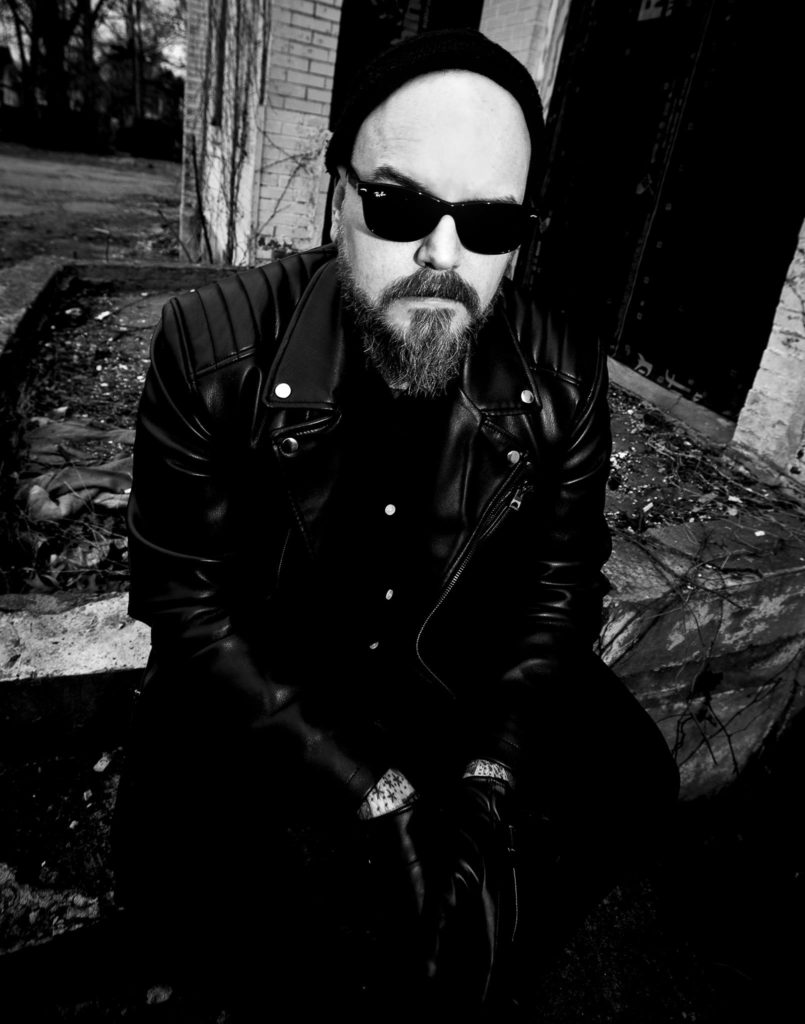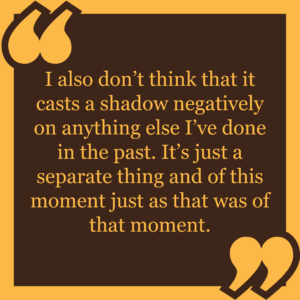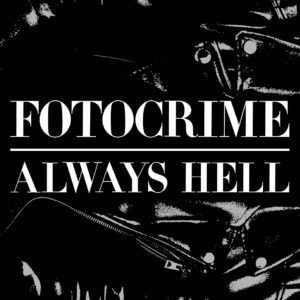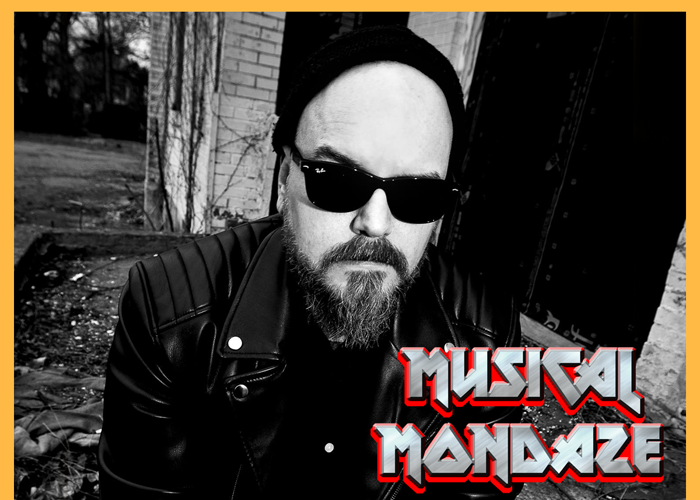 After amassing thousands of fans worldwide and releasing five studio albums, Louisville’s Coliseum decided to call it quits in 2015. Singer and guitarist Ryan Patterson stepped away from the band but not music itself, quickly beginning to write material that would become the foundation for his new solo project, Fotocrime. Patterson was hoping that his latest endeavor in music would be a complete departure from the experiences of his previous band, and so he went to work, eventually entering the studio to record “Always Hell,” his debut EP.
After amassing thousands of fans worldwide and releasing five studio albums, Louisville’s Coliseum decided to call it quits in 2015. Singer and guitarist Ryan Patterson stepped away from the band but not music itself, quickly beginning to write material that would become the foundation for his new solo project, Fotocrime. Patterson was hoping that his latest endeavor in music would be a complete departure from the experiences of his previous band, and so he went to work, eventually entering the studio to record “Always Hell,” his debut EP.
We recently sat down with Patterson to discuss how Fotocrime is the best representation of him as a songwriting in the moment, why he wanted to change the way he was used to singing, and how going solo can sometimes be a lonely undertaking.
TrunkSpace: Having spent so much time in a band atmosphere and having an established fanbase by way of that band, was it a daunting task to, in a way, be starting over with your latest project Fotocrime?
Patterson: Certainly. It was a big challenge that I was, wanting to accomplish myself, creating a record entirely on my own and doing something without that safety net of a band and with band members. Of course now I have people who are playing with me live, but yeah, it’s exciting and scary. It’s a big leap of faith and it’s nerve racking, but it’s cool because there’s a lot of hopefulness and a lot of that feeling of that you don’t know what’s coming next and it could be really great or it could all fall apart. But, it was time for me to do that. Writing wasn’t exactly entirely different from how I’ve written in my previous band, but I wanted to just challenge myself and see what I could accomplish, which is something I always want to do with music. And so for this, to try to make this new leap and just see what happened, it was exciting for sure.
TrunkSpace: You mentioned how the songwriting process was not much different from the way you were used to working, but is the result the best representation of you as a songwriter to date?
Patterson: I think it’s the best representation of the moment, and I think that’s the goal with anything that you do. I think anything that I’ve ever done, especially within the last seven years or so, is accurately representing me at the moment. Coliseum did that certainly and other side projects I do, if it’s something I’ve written or if it’s my playing… I think it always represents me. Even years ago in early Coliseum days or when I was doing bands when I was younger, it was certainly a snapshot of the moment and that’s what you want with recording and writing. I think with Coliseum, starting with our third album “House with a Curse” and onward, I think that was when it really represented me more fully than anything I had done because I would try to take leaps forward in terms of songwriting and how I approached it and how it represented me. I tried to look more in the big picture and long term and how things were being represented. So with Fotocrime, certainly it’s the purest distillation of self of anything that I’ve done because no one else other than J. Robbins who produced it was involved or even heard it or… anything. It’s very unique in that way and I’ll probably keep using the word exciting, but… it’s exciting and scary in that way.
I also don’t think that it casts a shadow negatively on anything else I’ve done in the past. It’s just a separate thing and of this moment just as that was of that moment.
TrunkSpace: Oftentimes a fanbase does not want to see or hear their favorite artist grow beyond a particular sound. Is the hope that Coliseum fans will follow you to Fotocrime or do you expect to start a new fanbase?
to start a new fanbase?
Patterson: Some of both I hope. I hope that people who have followed my music will continue to follow it, but of course I hope to reach new people. With Coliseum I think it was hard for us to be pinned down. We changed a lot over the course of 12 years… a lot of evolution and a lot of different things. People that might have been fans of our early work, weren’t fans of our later work, or, some knew our later records but didn’t know our early stuff at all. One thing I was happy to do, as hard as it was to say goodbye to something I worked on for so long and had represented me for so long, is that I was happy to let the history and some of the baggage of being in a long term band go. I was really happy to start fresh. I’m happy to say that that is everything that I have done, but this, Fotocrime, is brand new. It can go wherever it wants to go and it doesn’t have all of this history that can be a great asset and also a great hindrance.
TrunkSpace: Is part of that the fact that there are less creative constraints when you don’t need to use the rest of a band as a springboard for every idea that comes to you? And, on top of that, you aren’t having to work on a schedule that works for everybody and you can just write when you feel inspired?
Patterson: Yeah. That’s definitely a big bonus with working on your own, but it’s also difficult. Sometimes when there isn’t a rigid schedule, it’s hard to maybe get yourself into that mindset if there’s not a practice planned. I had a lot of false starts with trying to get this going, but once I did, it went really well.
It’s interesting. I don’t want it to be lonely, you know? (Laughter) I’m trying to figure out how to make that work. I did all of this on my own and there’s a lot of material that’s unreleased that will be released at some point… that was recorded at the same time as this EP. Now I have people playing with me for the live shows, so I’m unsure how things will develop and if I’ll continue to do everything on my own when recording or if we’ll write and record together. That kind of remains to be seen, but… I don’t want it to be an entirely solitary endeavor.
I knew I would never play it alone. I just didn’t think that would be visually appealing enough for this kind of music, but… I don’t know. We’ll just see how it goes. When I went to record the record, it wasn’t me alone. I was working with J. Robbins who was a producing/collaborator for many, many years. He’s someone I feel extremely comfortable with and someone who makes me feel safe and confident when recording. He has a great assistant named Matt who worked on the record with us. I was staying at J.’s house with his family so, I felt like I was kind of going into a family environment to make the record itself and now that there are people playing with me… one is Nick from the band Young Widows that I’ve been really close with for many, many years and a woman named Shelly who I’ve known for a long time… so it’s nice to feel comfortable in these situations but still have that ability to be standing on your own in the way that you want to, but be surrounded by great people that are helping you out and apart of it at the same time. Hopefully it’s going to have all of the benefits of being in a band, but none of the drawbacks. (Laughter)
TrunkSpace: Was there anything within the recording process that you wanted to try that you hadn’t attempted in the past in any of your previous projects?
Patterson: So much of Fotocrime is new. All drum machine and program drums, which I’ve only done with demos before. I’ve been writing demos for quite a long time using that, but I’ve never released anything with those type of drums. I knew a lot of things that I listened to, a lot of the classic bands who are really important to me, used a lot of programming and early drum machines. So I knew I could do it and it was appealing. There’s a lot of synthesizer… analog synth and digital synth. A lot of arpeggiating and step sequences and sequenced synth stuff, which I had done a tiny bit of in Coliseum, but not to this extent. So pretty much everything.
 The way I’m singing… trying to sing in a different register and find a different voice than Coliseum so it doesn’t sound like the same thing. I was really hoping for everything to be different. I think “Always Hell,” which is the first song we’ve released, is probably the most similar to Coliseum of anything that I’ve done so far with Fotocrime. That was by design so that we would have something to kind of bridge the gap, but other than that, it’s really outside of my… I wouldn’t say comfort zone, but outside of what I’ve done before.
The way I’m singing… trying to sing in a different register and find a different voice than Coliseum so it doesn’t sound like the same thing. I was really hoping for everything to be different. I think “Always Hell,” which is the first song we’ve released, is probably the most similar to Coliseum of anything that I’ve done so far with Fotocrime. That was by design so that we would have something to kind of bridge the gap, but other than that, it’s really outside of my… I wouldn’t say comfort zone, but outside of what I’ve done before.
TrunkSpace: How did you go about retraining yourself to sing in a new register?
Patterson: In terms of the melody I wanted to hear. The guitar tuning isn’t as low as it was with Coliseum. I think there was a level of aggression with the stuff I was doing before that even at our most melodic, and we got pretty melodic, there was still kind of a pummeling aspect to the music that was just kind of inherent in that band. So I am trying to find a place where I don’t have to push as hard and I can relax. And certainly some of it is just finding the songs that work. I wrote a lot of material when I first started writing for this that just wasn’t working. My voice wasn’t happening the way that I wanted it to. I wrote a lot of complete songs that as I started to get to the vocal point, it just wasn’t what I wanted, so I threw them out.
I’m not a person who knows exactly what key works best for me or what my exact vocal range is, but I was just trying to find something that feels more natural and that I’m not reaching for something, which is probably something I feel like I’ve always done as long as I’ve been singing… even from when I was a kid and singing in my band’s in high school. I’ve always kind of been reaching for something. Not necessarily in terms of pitch, but in terms of what I wanted my voice to do and was never able to pull it off. I absolutely feel the most comfortable I ever have with where my voice is with the Fotocrime material.


